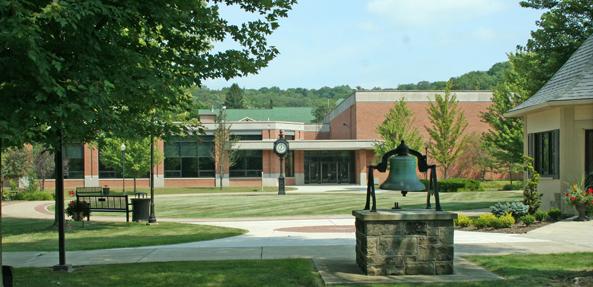Pitt is considering several options to deal with a lack of steady enrollment at Pitt-Titusville, including shuttering the branch campus, mainly due to a lack of steady enrollment, according to a report released last Thursday.
University officials released an analysis listing more problems than possible solutions for Pitt’s Titusville campus, including a fiscal year deficit of $1.7 million in 2016. As stated in the report, the biggest threat to the campus’s success is the spotty enrollment, combined with competition from other higher education providers in the region.
Administrators made a push in 2013 to innovate the courses provided at the campus by offering a petroleum technology course, as well as classes in computer technology, criminal justice, psychology, biological sciences and history. The addition of the degree in petroleum technology, which Titusville offered as an associate’s degree jointly with the Pitt-Bradford campus, made reference to the town’s history with the oil industry.
Enrollment numbers for these courses were lower than expected, however, and the petroleum technology course, though successful at Pitt’s Bradford campus, was terminated after just two years.
The report mentions that this decline fits into a larger trend occurring throughout Western Pennsylvania. At UPT alone, enrollment has declined 40 percent from the fall semester of 2009 to fall 2016, with its peak in 2007.
This decline goes beyond UPT. The analysis cites that enrollment across the Pennsylvania State System of Higher Education has decreased by more than 12 percent between the fall semester of 2010 and fall 2016.
Republican Kathy Rapp, who represents the district that includes Titusville in the state House of Representatives, noted that the campus plays a central role in the area’s economic well-being.
“I would be very concerned if Pitt decided to close the campus,” she told the Pittsburgh Post-Gazette Monday.
Structural changes related to decreases in student population have primarily affected schools in northwestern Pennsylvania, hitting hard at institutions of higher education like Clarion and Edinboro Universities. It’s also worth noting that flagship public universities have experienced an increase in enrollment in recent years, signifying a shift rather than disappearance of students in the area.
Concerns about the Titusville region have played a role in the University’s deliberations about a potential course of action regarding the branch campus, according to Pitt vice provost for special projects Lawrence Feick.
“We focused on three criteria: serving the education and training needs of Titusville and the region, the mission of the University of Pittsburgh and financial sustainability,” Feick said in a press release.
Officials have come up with five potential solutions to the school’s declining success — continue with the status quo, close the campus down entirely and three variations of revised ownership for the campus that would reduce University involvement with the campus.
Of the final three options, the first considers running the campus as commuter-only, while operations remain under control of Pitt. The second of these would still have Pitt own and operate the campus, but with outside academic providers offering additional programs. The last option would be a third party ownership of the campus, with Pitt as one of its tenants. In this arrangement, Pitt would still support academic programs on the campus along with several other tenants.
In its official report on the status of the branch campus, the University suggested that an alternative ownership scheme in Titusville could be better suited to the needs of the region.
“A separate ownership entity could, for example, sharpen the focus on local needs and be more aggressive, and nimble, in pursuing opportunities,” the report stated.
The University will be accepting public comments up until June 15 for consideration in the report’s revision and presentation to the Board of Trustees. This report will be finalized in the fall, followed by implementation over the next several years.
Representatives from Pitt will be at the UPT campus June 9 from 9 to 10 a.m. at Henne Auditorium to receive comment and input.



